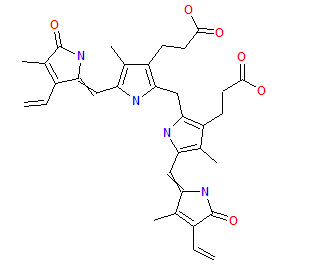Rotor syndrome: Difference between revisions
Irfan Dotani (talk | contribs) No edit summary |
Irfan Dotani (talk | contribs) No edit summary |
||
| Line 4: | Line 4: | ||
{{PleaseHelp}} | {{PleaseHelp}} | ||
==Overview== | |||
'''Rotor syndrome''' is a rare, benign [[autosomal recessive]] disorder of unknown origin. | |||
{{Infobox_Disease | | {{Infobox_Disease | | ||
| Line 19: | Line 22: | ||
MeshID = D006933 | | MeshID = D006933 | | ||
}} | }} | ||
===Presentation=== | |||
==Presentation== | |||
It has many things in common with [[Dubin-Johnson syndrome]] except that in Rotor Syndrome, the liver cells are not pigmented. The main symptom is a non-itching [[jaundice]]. There is a rise in [[bilirubin]] in the patient's [[Blood plasma|serum]], mainly of the conjugated type. | It has many things in common with [[Dubin-Johnson syndrome]] except that in Rotor Syndrome, the liver cells are not pigmented. The main symptom is a non-itching [[jaundice]]. There is a rise in [[bilirubin]] in the patient's [[Blood plasma|serum]], mainly of the conjugated type. | ||
| Line 38: | Line 35: | ||
| total urine coproporphyrin content || high with <70% being isomer 1 || normal with >80% being isomer 1 (normal urine contains more of isomer 3 than isomer 1) | | total urine coproporphyrin content || high with <70% being isomer 1 || normal with >80% being isomer 1 (normal urine contains more of isomer 3 than isomer 1) | ||
|} | |} | ||
==Historical Perspective== | |||
==Classification== | |||
==Pathophysiology== | |||
==Causes== | |||
==Differentiating {{PAGENAME}} from Other Diseases== | |||
==Epidemiology and Demographics== | |||
==Risk Factors== | |||
==Screening== | |||
==Natural History, Complications, and Prognosis== | |||
===Natural History=== | |||
===Complications=== | |||
===Prognosis=== | |||
==Diagnosis== | |||
===Diagnostic Criteria=== | |||
===History and Symptoms=== | |||
===Physical Examination=== | |||
===Laboratory Findings=== | |||
===Imaging Findings=== | |||
===Other Diagnostic Studies=== | |||
==Treatment== | ==Treatment== | ||
The [[liver]] is otherwise normal, and there is no need to treat this condition. It can be differentiated from Dubin Johnson syndrome by measuring the difference in urinary poryphrins. In Rotor syndrome there is an associated marked increase in urinary excretion of coproporyhrin I and III with < 80% being the I isomer. | The [[liver]] is otherwise normal, and there is no need to treat this condition. It can be differentiated from Dubin Johnson syndrome by measuring the difference in urinary poryphrins. In Rotor syndrome there is an associated marked increase in urinary excretion of coproporyhrin I and III with < 80% being the I isomer. | ||
===Medical Therapy=== | |||
===Surgery=== | |||
===Prevention=== | |||
==Eponym== | ==Eponym== | ||
| Line 53: | Line 92: | ||
==References== | ==References== | ||
{{reflist|2}} | |||
== External links == | == External links == | ||
Latest revision as of 17:14, 19 July 2016
|
WikiDoc Resources for Rotor syndrome |
|
Articles |
|---|
|
Most recent articles on Rotor syndrome Most cited articles on Rotor syndrome |
|
Media |
|
Powerpoint slides on Rotor syndrome |
|
Evidence Based Medicine |
|
Clinical Trials |
|
Ongoing Trials on Rotor syndrome at Clinical Trials.gov Trial results on Rotor syndrome Clinical Trials on Rotor syndrome at Google
|
|
Guidelines / Policies / Govt |
|
US National Guidelines Clearinghouse on Rotor syndrome NICE Guidance on Rotor syndrome
|
|
Books |
|
News |
|
Commentary |
|
Definitions |
|
Patient Resources / Community |
|
Patient resources on Rotor syndrome Discussion groups on Rotor syndrome Patient Handouts on Rotor syndrome Directions to Hospitals Treating Rotor syndrome Risk calculators and risk factors for Rotor syndrome
|
|
Healthcare Provider Resources |
|
Causes & Risk Factors for Rotor syndrome |
|
Continuing Medical Education (CME) |
|
International |
|
|
|
Business |
|
Experimental / Informatics |
Editor-In-Chief: C. Michael Gibson, M.S., M.D. [1]; Associate Editor(s)-in-Chief:
Please help WikiDoc by adding content here. It's easy! Click here to learn about editing.
Overview
Rotor syndrome is a rare, benign autosomal recessive disorder of unknown origin.
| Rotor syndrome | |
 | |
|---|---|
| Bilirubin | |
| ICD-10 | E80.6 |
| ICD-9 | 277.4 |
| OMIM | 237450 |
| DiseasesDB | 11671 |
| MeSH | D006933 |
Presentation
It has many things in common with Dubin-Johnson syndrome except that in Rotor Syndrome, the liver cells are not pigmented. The main symptom is a non-itching jaundice. There is a rise in bilirubin in the patient's serum, mainly of the conjugated type.
| Rotor syndrome | DJS | |
| appearance of liver | normal histology and appearance | liver has black pigmentation |
| gallbladder visualization | gallbladder can be visualized by oral cholecystogram | gallbladder cannot be visualized |
| total urine coproporphyrin content | high with <70% being isomer 1 | normal with >80% being isomer 1 (normal urine contains more of isomer 3 than isomer 1) |
Historical Perspective
Classification
Pathophysiology
Causes
Differentiating Rotor syndrome from Other Diseases
Epidemiology and Demographics
Risk Factors
Screening
Natural History, Complications, and Prognosis
Natural History
Complications
Prognosis
Diagnosis
Diagnostic Criteria
History and Symptoms
Physical Examination
Laboratory Findings
Imaging Findings
Other Diagnostic Studies
Treatment
The liver is otherwise normal, and there is no need to treat this condition. It can be differentiated from Dubin Johnson syndrome by measuring the difference in urinary poryphrins. In Rotor syndrome there is an associated marked increase in urinary excretion of coproporyhrin I and III with < 80% being the I isomer.
Medical Therapy
Surgery
Prevention
Eponym
Rotor syndrome is named after the Filipino internist, Arturo Belleza Rotor (1907-1988).[1]
See also
References
External links
Template:Endocrine, nutritional and metabolic pathology Template:Heme metabolism disorders